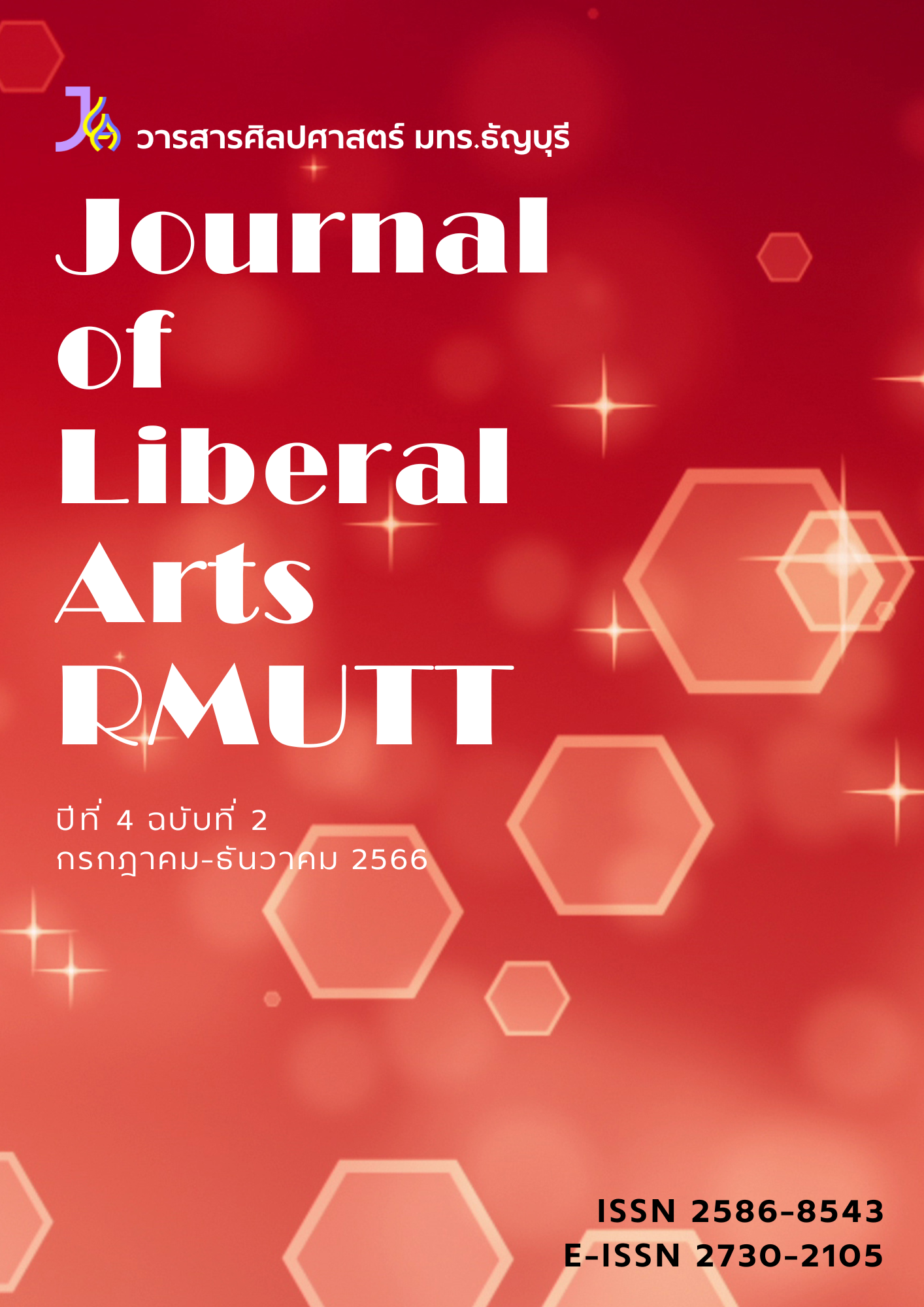บอร์ดเกมคำศัพท์ภาษาอังกฤษสำหรับนักเรียนระดับชั้นประถมศึกษาตอนปลาย ในโรงเรียนขนาดเล็กและขนาดกลาง
DOI:
https://doi.org/10.60101/jla.2023.4.2.2814คำสำคัญ:
บอร์ดเกม, คำศัพท์ภาษาอังกฤษ, การเรียนรู้โดยใช้เกมเป็นฐาน, การสอนภาษาอังกฤษบทคัดย่อ
วัตถุประสงค์ของงานวิจัยนี้คือ 1) เพื่อศึกษาผลการใช้บอร์ดเกมเพื่อพัฒนาคำศัพท์สำหรับนักศึกษาประถมศึกษาตอนปลายในโรงเรียนขนาดกลางและขนาดเล็ก และ 2) เพื่อศึกษาความพึงพอใจของนักเรียนที่ใช้บอร์ดเกม กลุ่มตัวอย่างในการวิจัยครั้งนี้ได้แก่ นักเรียนระดับชั้นประถมศึกษาตอนปลาย จำนวน 100 คน แบ่งเป็นนักเรียนระดับชั้นประถมศึกษาตอนปลายในโรงเรียนขนาดเล็ก จำนวน 50 คน และนักเรียนระดับชั้นประถมศึกษาตอนปลายในโรงเรียนขนาดกลาง จำนวน 50 คน โดยใช้วิธีการสุ่มอย่างแบบหลายขั้นตอน เครื่องมือในการวิจัยประกอบด้วย บอร์ดเกมฝึกคำศัพท์ภาษาอังกฤษ แบบทดสอบก่อนและหลัง แบบสังเกตพฤติกรรม แบบสัมภาษณ์ และแบบประเมินความพึงพอใจ สถิติที่ใช้ในการวิเคราะห์ข้อมูล ได้แก่ ความถี่ ค่าเฉลี่ย ร้อยละ ส่วนเบี่ยงเบนมาตรฐาน และ t-test
ผลการศึกษาพบว่านักเรียนระดับชั้นประถมศึกษาตอนปลายในโรงเรียนขนาดกลางและขนาดเล็กมีคะแนนคำศัพท์เพิ่มสูงขึ้นหลังจากเล่นบอร์ดเกมอย่างมีนัยสำคัญทางสถติที่ระดับ .001 และมีความพึงพอใจหลังจากเล่นเกมในระดับสูง สอดคล้องกับข้อมูลจากการสังเกตและผลการวิเคราะห์จากการสัมภาษณ์
เอกสารอ้างอิง
Alemi, M. (2010). Educational games as a vehicle to teaching vocabulary. The Modern Journal of Applied Linguistics, 2(6), 425-438.
Barbara, J. (2017). Measuring user experience in multiplayer board games. Games and Culture, 12(7–8), 623–649. https://doi.org/10.1177/1555412015593419
Billinghurst, M., & Kato, H. (2002). How the virtual inspires the real. Communications of the ACM, 45(7), 64-70.
Carter, M., Gibbs, M., & Harrop, M. (2014). Drafting an army: The playful pastime of warhammer 40,000. Games and Culture, 9(2), 122–147. https://doi.org/10.1177/1555412013513349
Dastgoshadeh, A. & Jalilzadeh, K. (2011). Language loss, identity, and English as an international language. European Journal of Social Sciences. 21(4), 659-665.
Ferreira, L. (2007). How to Teach Vocabulary Effectively: An Analysis of the Bbook Course Eyes and Sspies. Praia.
Fotini, G., & Makrina, Z. (2017). Adapting Board Games to Stimulate Motivation in Vocabulary Learning in Six Year Old Learners a Case Study. Journal of Studies in Education, 7(3), 1-28.
Fung, Y. M. & Min, Y. L. (2016). Effects of Board Game on Speaking Ability of Low-Proficiency ESL Learners. International Journal of Applied Linguistics and English Literature, 5(3), 261-271. https://doi.org/10.7575/aiac.ijalel.v.5n.3p.261
Gass, S., & Selinker, L. (2001). Second language acquisition. Manhwah: Lawrence Elbaum associate.
Hair, J. F., Hult, G. T. M., Ringle, C. M., & Sarstedt, M. (2022). A Primer on Partial Least Squares Structural Equation Modeling (PLS-SEM) (3rd ed.). Thousand Oaks, CA: Sage.
Hartshorne, J. K., Tenenbaum, J. B., & Pinker, S. (2018). A Critical Period for Second Language Acquisition: Evidence from 2/3 million English Speakers. Cognition, 177, 263-277.
Jacobs, G. M. & Kline-Liu, K. (1996). Integrating Language Functions and Collaborative Skills in the Second Language Classroom. TESL Reporter, 29(1), 21-33.
Kanoksilapatham, B. (2018). Local Context-Based English Lessons: Forging Northern Thai knowledge, Fostering English Vocabulary. 3L the Southeast Asian Journal of English Language Studies, 24(2), 127–142. https://doi.org/10.17576/3l-2018-2402-10
Ketmuni, M., & Naenon, P. (2021). The Use of Board Games to Develop English Vocabulary of Ornamental and Flowering Plants Sold in the Community of Primary 5 (grade 5) Students at Nikornradburana School, Thailand. Psychology and Education, 58(1), 1484-1489.
Langran, J. & Purcell, S. (1994). Language games and activities. Retrieved on May 7, 2023, from https://files.eric.ed.gov/fulltext/ED382019.pdf
Lee, J.M. (1996). English Games. Seoul: The People Publisher.
Lenneberg, E. H. (1967). The Biological Foundations of Language. Hospital Practice, 2(12), 59-67.
Li, Y., Han, Y., & Gao, X. (2018). Young Learners’ Motivation for Learning English. In Sue Garton & Fiona Copland (eds.), The Routledge handbook of teaching English to young learners. (pp.60-72). London: Routledge.
Liao, H., & Chen, M., (2012). Effects of Vocabulary Games on Lexical Growth and Retention of Low-Motivated EFL Learners In Taiwan. The Asia-Pacific Education Researcher, 21(3), 564-575.
Mubaslat, M. (2011). The Effect of Using Educational Games on the Students’ Achievement In English Language for the Primary Stage. Retrieved on May 7, 2023, from https://files.eric.ed.gov/ fulltext/ED529467.pdf
Paradis, M. (2004). A Neurolinguistic Theory of Bilingualism. The Netherlands: John Benjamins Publishing.
Putri, C. R., Usman, B., & Nasir, C. (2016). Board Game in Speaking Skill. Research in English and Education (READ), 1(2), 146-151. from https://jim.usk.ac.id/READ/article/view/2583/1375
Richard-Amato, P. A. (1988). Making it Happen: Interaction in the Second Language Classroom: From Theory to Practice. New York: Longman.
Rubin, J., & Thompson, I. (1994). How to be a More Successful Language Learner. Boston: Heinle and Heinle Publishers.
Schmitt, N. (2010). Researching Vocabulary: A Vocabulary Research Manual. Springer. https://doi.org/10.1057/9780230293977
Sintapanon, S. (2010). Teaching Innovation to Improve the Quality of Young People (4th ed.). Bangkok: Technique Printing.
Srisatitnarangul, B. (2002). Nursing Research Methodology. Bangkok: Faculty of Nursing, Chulalongkorn University.
Stanovich, K. (2000). Progress in Understanding Reading: Scientific Foundations and New Frontiers. New York: Guilford Press.
The National Institute of Educational Testing Service (Public Organization). (2019). SummaryONETP6_2562. Retrieved on June 7, 2023, from http://www.newonetresult.niets.or.th/AnnouncementWeb/ PDF/SummaryONETP6_2562.pdf?fbclid=IwAR1JOWjhFnFhXBTNaBHFXiCKDuJy63A4C2_O6bVHEKsSVXvwQhVqeuJkyhg
Tunchalearnpanih, P. (2012). Using Games on P. 6 Student's Vocabulary Learning. BangkoK: Srinakharinwirot University (SWU), Thailand.
Vygotsky, L. (1978). Mind in Society. Cambridge, MA: Harvard University Press.
Zagal, J. P., Rick, J., & Hsi, I. (2006). Collaborative Games: Lessons Learned from Board Games. Simulation & Gaming, 37(1), 24–40. https://doi.org/10.1177/1046878105282279
ดาวน์โหลด
เผยแพร่แล้ว
รูปแบบการอ้างอิง
ฉบับ
ประเภทบทความ
สัญญาอนุญาต
ลิขสิทธิ์ (c) 2023 วารสารศิลปศาสตร์ มทร.ธัญบุรี

อนุญาตภายใต้เงื่อนไข Creative Commons Attribution-NonCommercial-NoDerivatives 4.0 International License.













